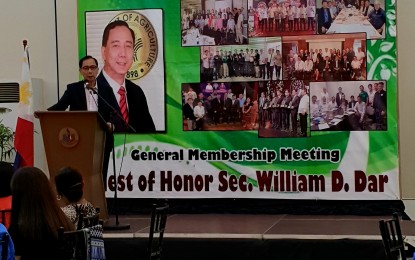
LAND USE ACT. Agriculture Secretary William Dar (in rostrum), proposes the enactment of a National Land Use Act to protect conversion of farmlands into other uses, in a forum with the Philippine Chamber of Agriculture and Food Inc. (PCAFI) held at the Quezon City Sports Complex on Saturday (Aug. 31, 2019). (PNA photo by Lilybeth G. Ison)
MANILA -- Agriculture Secretary William Dar proposed for the enactment of a National Land Use Act to protect conversion of farmlands into other uses, a major policy pushed by the private sector for many years but has faced opposition from some legislators.
“Our position is we don’t have a land-use system. That’s the issue of land conversion on one side. But bright agricultural lands, much more those with irrigation system, must not be converted (for industrial or residential use),” said Dar in a forum with the Philippine Chamber of Agriculture and Food Inc. (PCAFI) over the weekend held at the Quezon City Sports Complex.
Dar said the National Land Use Act would have been ratified a long time ago.
“The issue of land use has been there for the last 30 years. We hope this time around, it has to be legislated," he said.
"There should be a comprehensive land use for every area. (Even without the law yet), local government units should now go forward and start land use planning,” he added.
Meanwhile, PCAFI president Danilo V. Fausto said the Land Use Act will solidify the presence of investors in agriculture.
“Our investors will have stability with Land Use Act. They’re putting in millions and millions in investments. But at the end of the day, their land may be converted because we don’t have a proper land use law. Lands that are perfectly productive should remain to produce food for our country,” Fausto said.
On the other hand, Dar said there is also a need to implement non-tariff measures for the modernization of Philippine agriculture.
The non-tariff measures should include subsidies for ensuring Filipino farmers will be globally competitive and will have the capability to export goods.
Non-tariff measures will also support Filipino farmers in the form of stricter sanitary and phytosanitary rules for imported goods and other support such as farm to market roads, post-harvest facilities, research fund, and skills development upgrading.
"If we need to subsidize, we must subsidize. That’s a policy direction. (But) there are many ways, not only subsidy, that may be used under the WTO (World Trade Organization) (to help farmers)," Dar said.
"New equations, when you promote these in a big way, (will benefit farmers). We will take this route so we can become productive and competitive,” he added.
Dar’s declared policy toward non-tariff measures was a response to PCAFI’s position that the government has not supported the local farm sector as non-tariff measures are openly practiced by developed countries such as the United States, Japan, European countries.
Fausto said the US government approved a Farm Bill providing for USD850 billion budget including subsidies for American farmers.
“That’s against our PHP70 billion budget that’s all there is for our farmers for this year,” he noted.
The PCAFI forum was attended by close to 200 agriculture sector leaders in the private sector coming from 23 different farm subsectors. (PNA)
